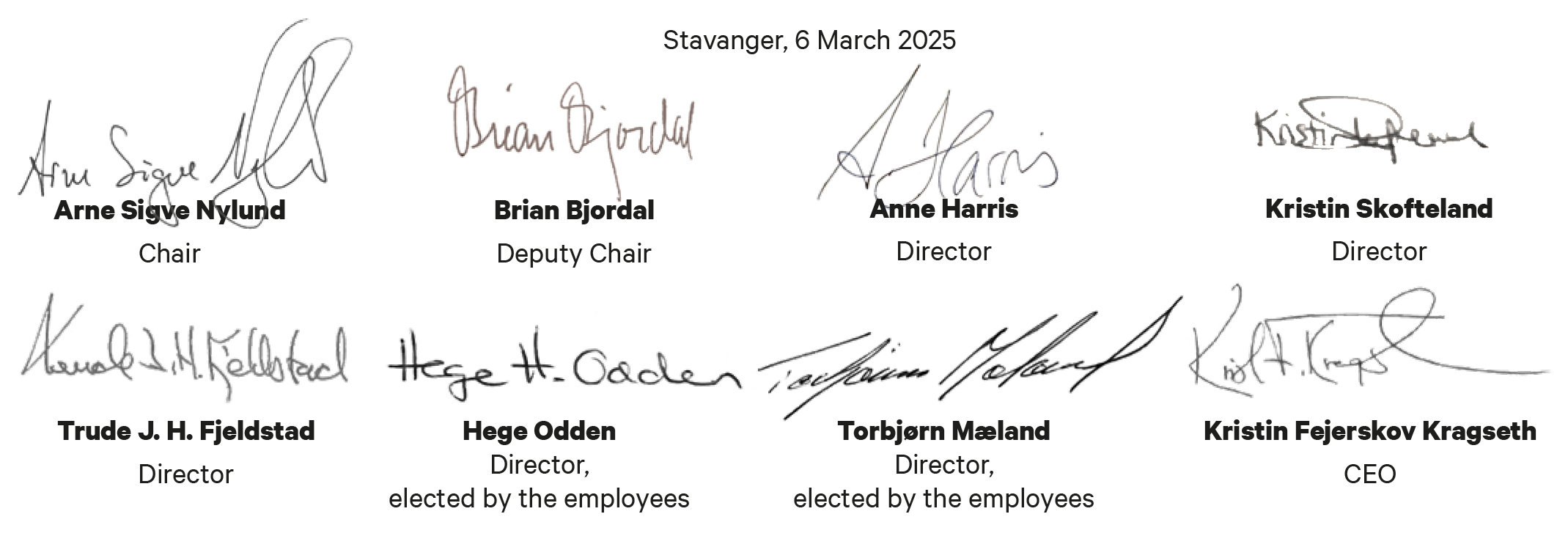At year-end, the SDFI portfolio consisted of 183 ownership interests in production licences; up ten from the beginning of the year. In January 2025, the Ministry of Petroleum and Energy completed its awards in pre-defined areas, where an additional 13 production licences were awarded with SDFI participation. As the largest partner on the NCS, which provides a unique overview, Petoro is well-positioned to identify opportunities and contribute to lessons learned across the portfolio. The company therefore works actively to use its position to create value for its owner.
The portfolio consists of 48 fields, 44 of which are producing. Major projects such as Johan Castberg, Kristin Sør phase 1, Ormen Lange phase 3 and Troll Vest electrification, as well as Oseberg increased gas capacity and partial electrification are under development.
Approximately 70 per cent of the gas production came from Troll, Ormen Lange and Oseberg. Production from mature oil fields continues to dominate liquids production from the SDFI portfolio, despite the fact that Johan Sverdrup accounted for 36 per cent of production in 2024. The Troll, Snorre, Oseberg, Åsgard, Heidrun, Gullfaks, Grane and Breidablikk fields accounted for 44 per cent of total liquids production for the year. In 2024, gas accounted for about two-thirds of overall production.
Petoro's strategy describes the company's goal-oriented efforts to generate the greatest possible values from the SDFI portfolio. The strategy has three priorities: (1) Mature fields, where the goal is to create more investment opportunities, (2) Area development, where the goal is to find solutions across the portfolio, (3) People and nature, where the goal is to take care of our surroundings.
Petoro works to reinforce value creation opportunities with emphasis on long-term business development through focused follow-up, supported by in-depth professional commitment.
In May 2024, Petoro and Equinor entered into an extensive ownership swap agreement on the NCS. This agreement will contribute to increased value creation and more effective resource management for the companies' activities on the Halten Bank. The agreement was approved by the authorities in 2024, and entered into force on 1 January 2025. Through this agreement, Petoro receives ownership interests of 22.5 per cent in Tyrihans, 3.7 per cent in Johan Castberg, 9.3 per cent in the Carmen discovery and 10 per cent in the Beta discovery, and simultaneously traded ownership interests of 21.4 per cent in Heidrun and 7.5 per cent in Noatun to Equinor. The agreement is value-neutral, which means that the value of the ownership interests swapped between the companies is considered to balance out.
Petoro was a participant in 11 exploration wells in 2024. These wells resulted in five discoveries; two of which are characterised as technical/non-commercial and one is unresolved. Othello (PL1086) in the southern North Sea and Cuvette (PL248F) west of Grosbeak are both considered to be potential commercial discoveries. The appraisal wells on Adriana and Sabina (PL211CS) also resulted in an increase in volume projections, and potential future development via Skarv will be considered.
The portfolio's estimated remaining reserves totalled 4,129 million boe at the end of the year, down by 346 million boe compared with the end of 2023. Reserve growth amounted to 43 million boe and mainly comes from Oseberg, Gullfaks and Martin Linge. With a production of 389 million boe, this yielded a reserve replacement rate of 11 per cent, compared with 16 per cent in 2023 and 49 per cent in 2022.
Additional information about the company's activities in 2024 can be found in Chapter 3, Activities and results from the year.
